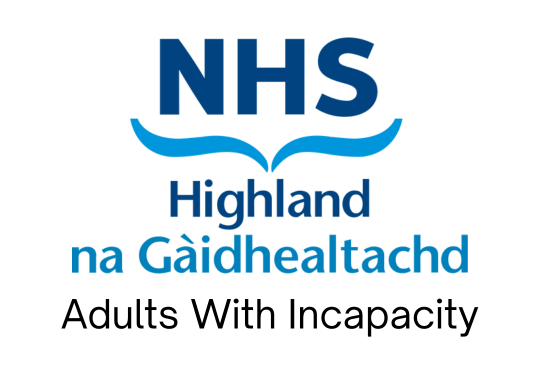Adults with Incapacity
On this page
The Adults with Incapacity (Scotland) Act 2000 is used along with the Adult Support and Protection (Scotland) Act 2007, the The Mental Health (Scotland) Act 2003 and other legislation, to support and protect vulnerable adults and promote their human rights.
The following information aims to:
- clarify social work duties
- support understanding and knowledge of the Adults with Incapacity (Scotland) Act 2000
- provide links to other organisations, information and services

About the Adults with Incapacity (Scotland) Act 2000
The Adults with Incapacity (Scotland) Act 2000 ('the Act', or 'the AWI Act') provides a legal framework for safeguarding and managing the welfare, property and financial affairs of adults (age 16 or over) who lack capacity, due to mental disorder, acquired brain injury, learning disability, dementia or an inability to communicate.
The Act defines capacity in relation to decision making ability and to take account of the complexity of decisions to be made. A person is not deemed to lack capacity by diagnosis alone. The Act provides the legal authority to regulate and intervene in the affairs of the adult who may not have the capacity to make important decisions about their welfare or finances for themselves.
Any intervention in the life of an adult who lacks capacity, must take account of the AWI Act principles.
Adults with Incapacity (Scotland) Act 2000 - Interagency Procedures 2025

Appendices: AWI Interagency Procedures 2025
AWI Appendices
Appendix 1: Decision Specific Screening Tool (1)
Appendix 2: Letter Templates (10)
- T1 Notice To Adult Re First Order Granted (Letter Template)
- T2 Notice To MWC Re First Order Granted
- T3 Notice To Adult Re Final Order Where Interim Order Previously Granted
- T4 Notice To MWC Re Final Order Where Interim Order Was Previously Granted
- T5 Notice To OPG LAWG Change Of Address TO Highland
- T6 Notice To MWC Re LAWG Transfer TO Highland
- T7 Notice To Adult Re Change Of Address To Highland
- T8 Letter To PWG In Relation To Supervision Duty
- T9 Letter Re Delay In PWG Application And LAWG Application Being Pursued
- Transfer Out Letter From CSWO To New LA
Appendix 3: Highland AWI Referral Form Revised (1)
Appendix 4: AWI S.O.Ps (5)
Appendix 5: S13ZA Procedures 2025 (1)
Appendix 6: Section 13ZA CHECKLIST (1)
Appendix 7: Case Conference Templates (4)
Important: Highland Health and Social Care Partnership
The Highland Council is the lead agency in respect of the Adults with Incapacity Act and is responsible for ensuring that any actions undertaken in respect of the legislation must comply with the law.
The Act places duties on Local Authorities. In Highland, these duties are undertaken by NHS Highland as lead agency for the provision of Adult Social Work and Adult Social Care Services. Young people aged 16-18 are supported by the Joint Transitions Social Work team.
Social Work and Adult Social Care contact information
Important: Highland Mental Health Officer Service
The Highland Mental Health Officer (MHO) Service is provided by The Highland Council. MHOs are registered social workers who have undergone specialist training and education to work with people with a mental disorder.
MHOs undertake assessments and reports to accompany applications where intervention is required under the AWI legislation.
Important: Scottish Government Guidance - Codes of Practice
The Scottish Government codes of practice provide guidance for anyone authorised to intervene under the Adults with Incapacity Act, supporting them in their role and function.
Other legislation and useful websites
Social Work (Scotland) Act 1968 - Section 13ZA
S13ZA SW(S) Act 1968 allows for the provision of services to adults with assessed needs, who lack capacity to consent to receive services, such as arranging a move to a residential care home. This can only be applied where certain criteria are met.
Any provision of care should be compliant with Article 5 of the European Convention on Human Rights. There should be no deprivation of liberty. For further information on what constitutes a deprivation of liberty, see Mental Welfare Comission for Scotland advice notes - Deprivation of Liberty (pdf).
